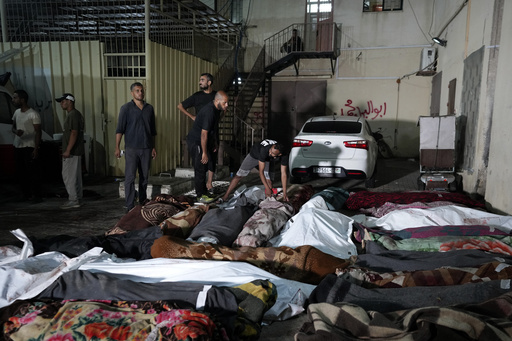
DUBAI, United Arab Emirates — The Israeli parliament is debating a proposal to cut ties with the United Nations agency dedicated to Palestinian refugees, a decision that could severely impact the humanitarian assistance currently supplied to the Gaza Strip. This initiative reflects a long-standing movement against the agency, known as UNRWA, which Israel claims has become compromised by Hamas affiliation. Proponents of the agency argue that the actual intent behind Israel’s actions is to downplay the plight of Palestinian refugees.
UNRWA serves as the primary provider of essential aid in Gaza, supporting millions of Palestinian refugees with services such as education, healthcare, and more, not just in Gaza but also throughout the Israeli-occupied West Bank. Juliette Touma, the communications director for UNRWA, expressed deep concern, stating, “If it passes and if it’s implemented, it’s a disaster. UNRWA is the largest humanitarian organization in Gaza … Who can do its job?”
Accusations against UNRWA by Israel include allegations of ignoring the involvement of its employees with Hamas and facilitating the diversion of aid for military purposes. Following the October 7, 2023 attack on southern Israel, Israel claims that approximately 12 out of 13,000 UNRWA workers in Gaza participated in the incident. The agency refutes these claims, asserting that it does not support armed groups and actively removes individuals suspected of militant ties.
The proposed legislation focuses on largely dismantling UNRWA’s operations in the Palestinian territories. With considerable support from various factions in Israel, the two bills aim to cut off ties between Israel and UNRWA while nullifying the legal protections granted to its personnel. Should these laws be enacted, UNRWA would be effectively barred from operating in both Gaza and the West Bank due to Israel’s control over access to these regions. This could potentially necessitate the relocation of the agency’s headquarters from Israeli-controlled East Jerusalem.
If the legislation is passed, the implementation is expected to occur within 60 to 90 days following a notification from Israel’s Foreign Ministry to the U.N. Philippe Lazzarini, UNRWA’s commissioner-general, cautioned earlier this month that the humanitarian framework in Gaza could “disintegrate” if the proposed laws were put into effect, jeopardizing access to critical resources like food and healthcare amidst the approaching winter months.
The humanitarian landscape in Gaza, home to approximately 2.3 million people, is dire, with a significant majority dependent on aid for survival. An estimated 90% of the population has been displaced due to ongoing conflict. In the wake of intensified military actions in Gaza post-October 7, the Health Ministry reports over 43,000 Palestinian casualties, although it does not distinguish between civilians and militants.
Reports suggest that Israel might consider taking over the aid distribution process directly or outsourcing it; however, no definitive plans have materialized yet. Implementing such an alternative would likely require substantial military resources and personnel, a challenging endeavor given the ongoing conflicts in both Gaza and Lebanon.
Other humanitarian organizations and U.N. agencies argue that there is no effective replacement for UNRWA, which operates numerous schools catering to roughly 47,000 students along with vocational training centers and health clinics in the West Bank.
UNRWA was established to assist around 700,000 Palestinians who fled or were displaced during the 1948 war surrounding the establishment of Israel. Supporters of the agency claim that Israel seeks to eliminate the issue of Palestinian refugees by dismantling UNRWA, which could further complicate the already contentious discussions about resettling refugees and their descendants, who number nearly 6 million today. While Israel advocates for their permanent resettlement elsewhere, Palestinians emphasize their right to return as a tenet of international law, a stance Israel opposes, fearing it could lead to a demographic shift within its borders.
The tension surrounding UNRWA’s perceived neutrality has been ongoing, with Israel alleging that hundreds of militants are employed by the agency without substantiating these claims. Following the recent attack, UNRWA terminated the employment of staff members implicated in the situation, which involved Hamas militants killing around 1,200 individuals and capturing approximately 250 others.
An independent review earlier this year acknowledged that while UNRWA has solid standards in place for maintaining neutrality, there are existing shortcomings in the execution of these policies. Issues highlighted include staff expressing political opinions publicly and curricula containing potentially controversial material in its schools. UNRWA maintains that it investigates all allegations of wrongdoing and holds its staff accountable, claiming that Israel has not provided evidence supporting its allegations against specific individuals.
Amid these developments, UNRWA remains a major employer within Gaza, where the local population continues to face severe economic hardship exacerbated by prolonged blockades imposed by Israel and Egypt. Since seizing control in 2007, Hamas operates both political and military activities within the territory, complicating the verification of backgrounds for potential civilian employees.
UNRWA continues to garner significant international backing, although several Western nations did suspend their funding following the allegations made in the wake of the October 7 attack. Unlike other nations, the United States has restored its financial assistance despite initially halting it. Recently, senior U.S. officials warned Israel that restricted aid access in Gaza could jeopardize crucial military support from the U.S., emphasizing the need to strike a balance between security and humanitarian needs.
In light of these tensions, a unified statement from Canada, Australia, France, Germany, Japan, South Korea, and the United Kingdom conveyed their serious concerns regarding the legislation, asserting that UNRWA provides essential humanitarian support that would be severely disrupted without it.
